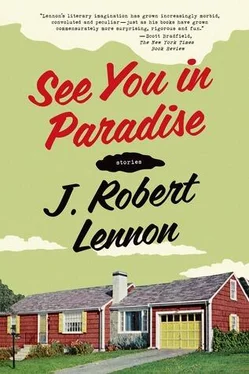The restaurant he chose was a new one in town — a Japanese hibachi steakhouse just off the highway, near the mall. Upon first glance, the place didn’t look promising, with framed posters on the walls and plastic willow branches arranged halfheartedly in vases on the chipboard tables. Six hibachi grills filled the far side of the room, arranged in groups of two and bracketed by countertops, where dining spectators were to sit. Philip and Evangeline were seated — with great fussing and wringing of hands over Philip’s wheelchair, so eager was the staff to avoid pissing off their first cripple — between a small family glumly celebrating a teenager’s birthday and a pair of college-age lovebirds with their arms wrapped around each other.
Orders were taken, and the hibachi chef came out — a tall Asian man (though not, Philip believed, Japanese) whose hat made him appear taller still — pushing a sturdy wheeled cart of brushed aluminum. On the cart were arranged their uncooked meals, as well as a mountain of butter, squeeze bottles of various liquids, coffee-mug-sized chrome spice shakers, and a canister of utensils.
A familiar dread came over Philip, the same one he felt whenever he was about to witness any kind of performance, whether on a stage or at his front door, behind the book of Mormon. He turned to his wife to express his feelings but was brought up short by the expression on her face: one of rapt attention and giddy anticipation. It would have taken a trained eye to detect these emotions, but a trained eye was what Philip had, and he kept his mouth shut.
For the chef’s part, he maintained an expression of mock dignity and spoke not at all. Philip understood that women probably found him very attractive. He began his presentation by squeezing some kind of clear liquid onto the grill’s clean steel surface, then setting it on fire with a cigarette lighter. The flames shot up two feet and Philip reared back. Everyone laughed. The college girl screamed and snuggled deeper into her lover’s arms.
Next he placed an egg on the grill where the flames had been and spun it with his thumb and middle finger. He drew a spatula from a holster on his belt — the belt was leather, with metal sheathes for his tools, giving him the air of a culinary Batman — and scooped up the spinning egg. He tossed it into the air; caught it, still spinning, on the spatula’s end; tossed it again. Finally, he lobbed it toward the college girl, then shot out a long-fingered hand without looking and plucked it from the air inches from her face.
Her scream this time was truly earsplitting. Philip hated her, the way he had taken to hating random people since the accident: hated the scream, the lipstick, the giant breasts. He hated the boyfriend and his wounded masculine laugh, huh-huh-huh. But Evangeline — Evangeline was concentrating with all her might, her lower lip gently held captive between her teeth.
The chef flung the egg into the air, bisected it against his spatula, flipped the shell into the trash. He scrambled the egg, spooned rice on top, spun his knife in the air — and by the time he caught it, a pile of green onions had materialized on the grill for him to chop.
It went on like this for ten minutes. The guy was big on throwing. Chicken breasts, steaks sailed through the air. A rain of shrimp, a fusillade of squash. Sauce bottles he lobbed from hand to hand and back into their holsters. Metal glinted and chimed. There was a lot of winking, especially at the teenager’s nervous mother, and a lot of spinning around to catch things left suspended. When the cooking was done, the food rocketed onto the plates, and not a morsel was spilled. The diners clapped, the chef bowed. He scraped the grill free of debris, scrubbed it, and, with a final, comically deep bow, wheeled his cart away.
Philip had to admit that his meal was very good, fresh and unadorned. He didn’t especially want to see the floor show again, but the food he liked. When they were through eating, they left, and in a wild, impetuous gesture of magnanimity, Philip tipped nearly 20 percent. Their driver, unfortunately, had to be hunted down; they discovered him behind some shrubbery, smoking with a waitress from the Applebee’s next door. He brought them home and once again Philip tipped, though not so much this time around. Then they went inside and went to bed.
The mattress conveyed to Philip the information that Evangeline lay awake, staring at the ceiling. She rarely said much, but tonight she had said nothing at all, not since they left the house. He glanced at her. In the light from the street, he could see that her cheeks were flushed, her forehead slightly wet. She exuded the tense stillness that came over her when she was trying to keep her breaths even, to trick her body into sleep.
“Did you enjoy dinner?” he asked.
“Yes,” was her immediate answer.
“We should do that again.”
She managed a nod.
After a moment, and with considerable effort, Philip turned his body to face her, and snaked his hand up underneath her nightdress to cup one breast, then the other. After that he slid his fingers between her legs. She didn’t resist, but she didn’t help him out, either. It was warm and dry down there, and stayed that way. He thought perhaps he felt something, himself — some kind of faint stirring or itch? At times he experienced ghost sensations, dreams his body entertained while it slept. But maybe this was the real thing. He shoved a hopeful free hand into his pajama bottoms: no dice. Evangeline, having evidently read his mind, trained upon him a kind, pitying look. “Thank you, dear,” she said. Probably she was referring to the dinner.
The next day, everything was back to normal. Philip returned to the half-time, halfhearted work his firm now offered him, perhaps out of pity; Evangeline returned to the office. Months passed in much the same sort of stasis they used to, with the exception that, every once in a while, Evangeline assumed an expression of squinting intensity, as though she was looking at something very small and very far away. But he didn’t ask what she was thinking of. Once, while wheeling past the recently expanded bathroom, with its widened door, chrome support hardware, and disinfected-daily bathtub stool, he heard a small surprised sound escape his wife, a kind of chirp or hoot, which reverberated on the tile like a gunshot. It was repeated seconds later, longer this time, drawn-out, a coo. When she came out a couple of minutes later, smoothing her dress with her long fingers, she didn’t look any different.
Her birthday was approaching. Philip trolled his usual internet haunts to find something for her that might result in some kind of reaction. Kitchen supplies, he thought — she uses them daily, and not without pleasure. At least he would get to see his gift in action, see it making her infinitesimally happier. He browsed a commercial kitchen retailer, noticed the chef’s hats, remembered their night out. Typed “Hibachi” into the search box. Hit enter.
There it was! The Oiled Birch and Stainless Steel Professional Hibachi Kitchen Island and Accessory Kit, fourteen hundred dollars plus freight delivery. His finger hovered over the mouse button. Philip was no good at gifts — he usually bought Evangeline jewelry, because it was something that men were supposed to buy for women, though he had never seen her wear any of it, nor any other jewelry, either. It was months after giving her earrings that he noticed her ears weren’t pierced. Even the leather eyeglass case he had gotten her had gone unused; her glasses were only ever on her bedside table or her face.
And so the accountant in him, which almost entirely filled his broken self, told him not to pull the trigger on the hibachi set. It was expensive and untested; its size would prevent Evangeline’s being able to pretend it didn’t exist. And if it was a mistake — surely, it was? — it would have to be rectified. And able-bodied Evangeline would be the one to whom this responsibility would fall.
Читать дальше












